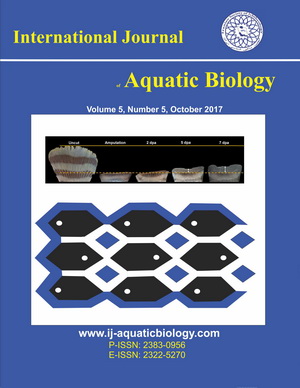Compensatory growth response of sailfin molly, Poecilia latipinna (Lesueur, 1821) to starvation and refeeding
Downloads
Compensatory growth response and body composition of male sailfin molly, Poecilia latipinna subjected to short-term starvation and subsequent feeding were studied for 54 days. Four feeding schedules were used in this study: C, Control (were fed to apparent satiation throughout the experiment); T1, Treatment 1 (3 days Starvation and 6 days refeeding); T2, Treatment 2 (6 days Starvation and 12 days refeeding); T3, Treatment 3 (9 days Starvation and 18 days refeeding). At the end of the experiment, the starved fish gained a body weight comparable to that of the control fish. There were no differences in condition factor, specific growth rate and weight gain between the starved and control fish at the end of the experiment. Daily feed intake was significantly higher in T3 than that in the control. Short-term starvation did not influence protein, lipid and ash contents. Moisture content of T2 and T3 fish were significantly higher than those of T1 and control fish. The results indicated that complete compensation occurred in the starved fish and that this species can tolerate to short term starvation without any significant effects on growth and feeding performance.
Downloads
Ali M., Nicieza A., Wootton R.J. (2003). Compensatory growth in fishes: a response to growth depression. Fish and Fisheries, 4: 147-190.
AOAC (Association of Official Analytical Chemists). (1990). Official methods of analysis, 15th edition. Association of Official Analytical Chemists, Arlington, Virginia, USA. 1298 pp.
Dobson S.H., Holmes R.M. (1984). Compensatory growth in the rainbow trout, Salmo gairdneri Richardson. Journal of Fish Biology, 25: 649-656.
EroldoÄan O.T., Kumlu M., Kirisx G.A., Sezer B. (2006). Compensatory growth response of Sparus aurata following different starvation and re-feeding protocols. Aquaculture Nutrition, 12: 203–210.
Falahatkar B., Foadian A., Abbasalizadeh A., Gilani M.H.T. (2009). Effects of starvation and feeding strategies on growth performance in sub-yearling great sturgeon (Huso huso). In: The Sixth International Sturgeon Symposium, Wuhan, China. pp: 241–243.
FAO. (2007). Fisheries and Aquaculture Information and Statistics Service (FIES). Fisheries Commodities Production and Trade 1976-2005, release April (2007) Rome, Italy.
Fernando A.A., Phang V.P.E. (1994). Freshwater Ornamental Fish Aquaculture in Singapore. Singapore Polytechnic, Singapore. 123.
Gaylord T.G., Gatlin III D.M. (2001). Dietary protein and energy modification to maximize compensatory growth of channel catfish, Ictalurus punctatus. Aquaculture, 194: 337-348.
Gaylord T.G., Gatlin III D M. (2000). Assessment of compensatory growth in channel catfish, Ictalurus punctatus R. and associated changes in body condition indices. Journal of the world Aquaculture Society, 31: 326–336.
Grigorakis K., Alexis M.N. (2005). Effects of fasting on the meat quality and fat deposition of commercial-size farmed gilthead sea bream (Sparus aurata L.) fed different dietary regimes. Aquaculture Nutrition, 11: 341-344.
Harpaz S., Hakim Y., Slosman T., Barki A., Karplus I., Eroldogan O.T. (2005). Effects of different feeding levels during day and/or night on growth and brush border enzyme activity in juvenile Lates calcarifer fish reared in freshwater re-circulating tanks. Aquaculture, 248: 325–335.
Hayward R.S., Noltie D.B., Wang N. (1997). Use of compensatory growth to double hybrid sunfish growth rates. Transactions of the American Fisheries Society, 126: 316–322.
Heide A., Foss A., Stefansson S.O., Mayer I., Norbery B., Roth B., Jenssen M.D., Nortvedt R., Imsland A.K. (2006). Compensatory growth and fillet crude composition in juvenile Atlantic halibut: Effects of short-term starvation periods and subsequent feeding. Aquaculture, 261: 109-117.
Ince B.W., Thorpe A. (1976). The effects of starvation and force feeding on the metabolism of the Northern Pike, Esox lucius L. Journal of Fish Biology, 8: 79–88.
Jacobs K. (1971). Livebearing aquarium fishes. The Macmillan Company, California. 459.
Jobling M. (1980). Gastric evacuation in plaice, Pleuronectes platessa L.: effects of temperature and fish size. Journal of Fish Biology, 17: 547-551.
Jobling M. (1987). Growth of Arctic charr (Salvelinus alpinus L.) under conditions of constant light and temperature. Aquaculture, 60: 243–249.
Jobling M. (1994). Fish bioenergetics. Chapman and Hall. New York, New York, USA. 309.
Jobling M., Koskela J. (1996). Interindividual variations in feeding and growth in rainbow trout during restricted feeding and in subsequent period of compensatory growth. Journal of Fish Biology, 49: 658-667.
Kankanen M., Pirhonen J. (2009). The effect of intermittent feeding on feed intake and compensatory growth of whitefish Coregonus lavaretus L. Aquaculture, 288: 92-97.
Krogdahl A., Bakke-McKellep A.M. (2005). Fasting and refeeding cause rapid changes in intestinal tissue mass and digestive enzyme capacities of Atlantic salmon Salmo salar L. Comparative Biochemistry and Physiology, 141(A): 450–460.
Li M.H., Robinson E.H., Bosworth B.G. (2005). Effects of periodic feed deprivation on growth, feed efficiency, processing yield, and body composition of channel catfish Ictalurus punctatus. Journal of the world Aquaculture Society, 36: 444-453.
Livengood E.J., Chapman F.A. (2007). The ornamental fish trade: an introduction with perspectives for responsible aquarium fish ownership. University of Florida, IFAS extension, FA 124. http://edis.ifas.ufl.edu/FA124.
Love R.M. (1970). The chemical biology of fishes. Academic Press, London, UK. 547.
Lovell T. (1980). Nutrition and feeding of fish. Kluwer Academic Publishers, USA. 267.
Mattila J., Koskela J., Pirhonen J. (2009). The effect of the length of repeated feed deprivation between single meals on compensatory growth of pikeperch Sander lucioperca. Aquaculture, 296: 65–70.
Mehner T., Wieser W. (1994). Energetic and metabolic correlates of starvation in juvenile perch, Perca fluviatilis. Journal of Fish Biology, 45: 325–333.
Miglavs I., Jobling M. (1989). The effects of feeding regime on proximate body composition and patterns of energy deposition in Juvenile Arctic Charr, Salvelinus alpines. Journal of Fish Biology, 35: 1-11.
Nicieza A.G., Metcalfe N.B. (1997). Growth compensation in juvenile Atlantic salmon: Responses to depressed temperature and food availability. Ecology, 78: 2385-2400.
Nikki J., Pirhonen J., Jobling M., Karjalainen J. (2004). Compensatory growth in juvenile rainbow trout, Oncorhynchus mykiss (Walbaum), held individually. Aquaculture, 235: 285–296.
Qian X., Cui Y., Xiong B., Yang Y. (2000). Compensatory growth, feed utilization and activity in gibel carp, following feed deprivation. Journal of Fish Biology, 56: 228–232.
Quinton J.C., Blake R.W. (1990). The effect of feed cycling and ration level on the compensatory growth response in rainbow trout, Oncorhynchus mykiss. Journal of Fish Biology, 37: 33–41.
Russell N.R., Wootton R.J. (1992). Appetite and growth compensation in the European minnow, Phoxinus phoxinus (Cyprinidae) following short periods of food restriction. Environmental Biology of Fishes, 34: 277–285.
Snelson F.F. (1982). Indeterminate Growth in Males of Sailfin Molly, Poecilia latipinna. Copeia, 2: 296-304.
Tian X., Qin J.G. (2003). A single phase of food deprivation provoked compensatory growth in barramundi, Lates calcarifer. Aquaculture, 224: 169–179.
Tian X., Qin J.G. (2004). Effects of previous ration restriction on compensatory growth in barramundi, Lats calcarifer. Aquaculture, 235: 273-283.
Wang Y., Cui Y., Yang Y., Cai F. (2000). Compensatory growth in hybrid tilapia, Oreochromis mossambicus í— O.niloticus, reared in seawater. Aquaculture, 189: 101-108.
Xie S., Zhu X., Cui Y., Lei W., Yang Y., Wootton R.J. (2001). Compensatory growth in the gibel carp following feed deprivation: temporal patterns in growth, nutrient deposition, feed intake and body composition. Journal of Fish Biology, 58: 999-1009.
Zhu X., Cui Y., Ali M., Wootton R.J. (2001). Comparison of compensatory growth responses of juvenile three-spined stickleback and minnow following similar food deprivation protocols. Journal of Fish Biology, 58: 1149-1165.
Zhu X., Xie S., Zou Z., Lei W., Cui Y., Yang Y., Wootton R.J. (2004). Compensatory growth and food consumption in gibel carp, Carassisus auratus gibelio, and Chinese long snout catfish, Leiocassis longirostris, experiencing cycles of feed deprivation and re-feeding. Aquaculture, 241: 235–247.








